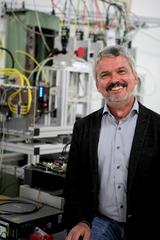DESY particle physicist Felix Sefkow. Credit: DESY
DESY particle physicist Felix Sefkow is new project coordinator
Felix Sefkow, particle physicist at DESY, is the new coordinator of the project “AIDA-2020”, which receives 10 million euros in funds from the European Union. AIDA is short for Advanced European Infrastructures for Detectors at Accelerators and the project brings together physicists and engineers from 38 institutions in 19 countries, as well as CERN, to develop and optimise research facilities, testing tools and installations that are fundamental to developing future detectors and new technologies.
Future projects in particle physics – such as the upgrade to the Large Hadron Collider, LHC, at CERN or the planned International Linear Collider, ILC – will need detectors capable of doing things that are impossible today. This includes radiation hardness, fast read-out times and best resolutions, as well as detailed reconstruction of particle signatures after a collision. To enable these various developments, the people developing detectors need facilities like test beams where they can test their prototypes and which are equipped to meet the increasingly high demands; they need efficient micro-electronics, good software and, most of all, a lively exchange of expertise and experience.
“What distinguishes AIDA-2020 from its predecessors AIDA and EUDET is the fact that it brings together the gas detector specialists, silicon experts, and calorimeter developers from different project communities, such as the LHC and ILC, in joint projects, so they can more easily talk to each other and to industrial users,” says project coordinator Sefkow. “This will help us with the big challenges of the future.” The focus of the LHC detectors for the forthcoming high-luminosity phase is shifting towards precision and thus drawing on ideas from the ILC-driven developments; conversely, the technical implementation of the ILC detectors would build upon the experiences at the LHC.
One of the concrete goals is a database, which will list in detail all the irradiation facilities in Europe. Developers who want to test their newly developed equipment under conditions resembling those of the future high-powered LHC can use it to find a facility offering the ideal properties for their purposes. Short videos describing the various testing facilities at AIDA-2020 institutions will facilitate access to them as well. There will also be a video describing DESY’s beamline facilities. In addition, DESY provides three workpackage coordinators, it is a leader in software development, beamline equipment and use, and it is building new beam telescopes for use at DESY and CERN.
Sefkow took over from the French scientist Laurent Serin. Sefkow's first official appearance as project coordinator will be at the first annual meeting of AIDA-2020, which takes place from 13 to 17 June at DESY.









